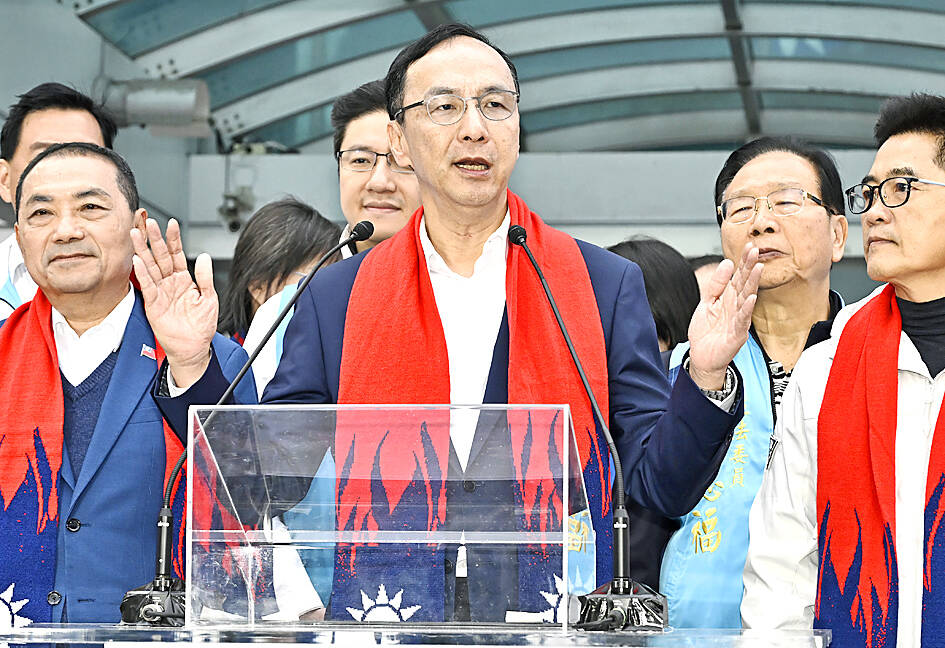A former Chinese Nationalist Party (KMT) spokesperson yesterday suggested that KMT Chairman Eric Chu (朱立倫) should be replaced following the party’s elections losses on Saturday.
Using sports terms to make an analogy, former KMT spokesman and former KMT Youth Department director Hsiao Ching-yen (蕭敬嚴) wrote on Facebook that the “team’s manager should reflect on the team’s poor performance, and the head coach should take responsibility and be fired.”
KMT chairs in the past always resigned when the party lost in general elections, with the exception of 2004 when then-president Chen Shui-bian (陳水扁) was shot while campaigning for re-election, Hsiao said, adding that it was “natural” that Chu should retire now to take responsibility for Saturday’s electoral defeats.

Photo: Chen Chih-chu, Taipei Times
“The presidential candidate themselves might be to blame for their own poor performance in the polls,” he said. “However, the party chairman — who chooses the legislators-at-large — should ultimately take responsibility for the party’s election losses.”
The KMT secured only 4.67 million votes this time, compared with 5.52 million votes in the 2020 presidential election, he said, adding that the problem appeared to be more with the overall party image than with the candidate themselves.
This was demonstrated by a lack of unity within the party over the past year, and problems related to the selection of a candidate, he said.
Meanwhile, responding to the election results, Chu on Saturday evening posted to Facebook saying that the 52 legislative seats that the KMT came out of the election with this year showed that the public had put trust in the KMT.
“We are on the last mile toward bringing order to the Republic of China. The KMT must continue to reform for the sake of Taiwanese,” he wrote.
Chu is likely to be retained as KMT chairman, as the party hopes to concentrate its efforts on the legislature and on the supervision of the Democratic Progressive Party, a source said.
KMT Culture and Communications Committee head Lin Kuan-yu (林寬裕) yesterday echoed this sentiment, saying that the legislative wins had “united the KMT, which would not be knocked down again.”
The KMT Central Standing Committee would listen to suggestions and continue to reform, he said.
Separately, defeated KMT presidential candidate New Taipei City Mayor Hou You-yi (侯友宜) yesterday said that his failure to work hard enough had cost him the election, and that he hoped Chu would continue to lead the KMT.
“If Chu does not want to lead the party, then I am worried nobody else would be able to do it,” KMT legislator-elect Hsu Chiao-hsin (徐巧芯) said, adding that she would fully support Chu staying on as the party chairman.
Former KMT legislator Yang Chiung-ying (楊瓊瓔) said it was “not the time to discuss resignations.”
Additional reporting by Tung Kuan-yi, Ho Yu-hua and Ou Su-mei

Alain Robert, known as the "French Spider-Man," praised Alex Honnold as exceptionally well-prepared after the US climber completed a free solo ascent of Taipei 101 yesterday. Robert said Honnold's ascent of the 508m-tall skyscraper in just more than one-and-a-half hours without using safety ropes or equipment was a remarkable achievement. "This is my life," he said in an interview conducted in French, adding that he liked the feeling of being "on the edge of danger." The 63-year-old Frenchman climbed Taipei 101 using ropes in December 2004, taking about four hours to reach the top. On a one-to-10 scale of difficulty, Robert said Taipei 101

Nipah virus infection is to be officially listed as a category 5 notifiable infectious disease in Taiwan in March, while clinical treatment guidelines are being formulated, the Centers for Disease Control (CDC) said yesterday. With Nipah infections being reported in other countries and considering its relatively high fatality rate, the centers on Jan. 16 announced that it would be listed as a notifiable infectious disease to bolster the nation’s systematic early warning system and increase public awareness, the CDC said. Bangladesh reported four fatal cases last year in separate districts, with three linked to raw date palm sap consumption, CDC Epidemic Intelligence

Taiwanese and US defense groups are collaborating to introduce deployable, semi-autonomous manufacturing systems for drones and components in a boost to the nation’s supply chain resilience. Taiwan’s G-Tech Optroelectronics Corp subsidiary GTOC and the US’ Aerkomm Inc on Friday announced an agreement with fellow US-based Firestorm Lab to adopt the latter’s xCell, a technology featuring 3D printers fitted in 6.1m container units. The systems enable aerial platforms and parts to be produced in high volumes from dispersed nodes capable of rapid redeployment, to minimize the risk of enemy strikes and to meet field requirements, they said. Firestorm chief technology officer Ian Muceus said

MORE FALL: An investigation into one of Xi’s key cronies, part of a broader ‘anti-corruption’ drive, indicates that he might have a deep distrust in the military, an expert said China’s latest military purge underscores systemic risks in its shift from collective leadership to sole rule under Chinese President Xi Jinping (習近平), and could disrupt its chain of command and military capabilities, a national security official said yesterday. If decisionmaking within the Chinese Communist Party has become “irrational” under one-man rule, the Taiwan Strait and the regional situation must be approached with extreme caution, given unforeseen risks, they added. The anonymous official made the remarks as China’s Central Military Commission Vice Chairman Zhang Youxia (張又俠) and Joint Staff Department Chief of Staff Liu Zhenli (劉振立) were reportedly being investigated for suspected “serious